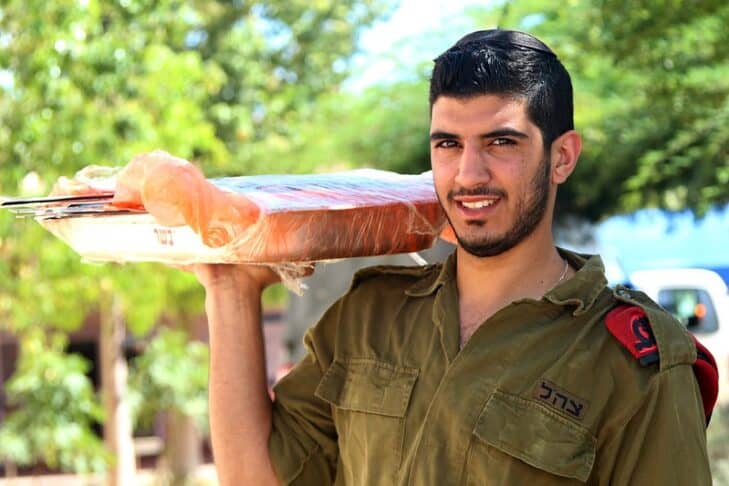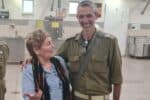The army marches on its stomach, but it seems to me that in the current war, the stomach is screaming for help. Why?
Meal times do not match my digestive system, which has been accustomed to other rhythms for 55 years:
Breakfast starting at 07:30.
Lunch at 11:30.
Dinner at 17:30.
Eating impulsively during the day.
Coffee corners with various items such as cakes, waffles, cookies, apples, other vegetables, and, of course, lots of coffee.
The contents of the meals are not synchronized with my blood tests. I assume that if each soldier’s personal doctor were to examine the daily menu, they would question the expected symptoms for soldiers after this diet:
Related
Lunch: A vegetable salad, perhaps from the morning, a meat dish (unspecified, perhaps roast chicken), clean rice, and healthy couscous. There’s also a vegetarian or vegan dish, depending on dietary preferences.
Dinner: A hard-boiled egg (easy to prepare), salad (is it from the morning, afternoon, or yesterday?), pastries, an inexplicable addition of a potato, and some type of meat dish. Dinner is a mix between the sacred and the mundane, not clearly defined—a combination of meat with dairy. It’s hard to watch and even harder to digest. This is a representative but non-binding example.
I heard that the army claims to be “green” toward the earth, even though green is the color of the enemy—Hezbollah, Hamas. I must have heard wrong. The dinnerware for military personnel consists of plastic plates and cutlery. I assume this is due to cleanliness considerations and a shortage of dinnerware for all the emergency recruits.
Calculations for a third-grade lesson: 300,000 recruits (according to foreign publications) x 3 meals a day x 1.5 portions per soldier (reserve soldiers eat even if they are not really hungry) x 2 plates per portion = 2,700,000 plates per day. This calculation does not include cutlery, glasses, depreciation, wear and tear, replacements in appliances, and more. 2.7 million plates a day—you could build a plastic tank from that, am I wrong? In short, the army is not green at all.
Explanation of successes
The army saves on small plates (someone believes this will prevent the soldiers from overeating, but that’s not the case). The plates are made of extremely thin plastic, reducing their strength and operational efficiency for the sake of financial savings. A soldier, unaware of the plates’ nature, takes one plate while, in the other hand, he is holding cutlery or engaging in friendly banter with a comrade he hasn’t seen since their rookie years, or shoos a fly away. Carrying just one plate, he approaches the food distribution station. The cook (or perhaps more fittingly, the server, as I doubt they concocted any recipes from what’s served) wields a large ladle, loaded with all the goodness of meat or potato stew, and tosses it onto the same flimsy plate. An inattentive and unskilled soldier discovers that the plate cannot withstand the weight of the food, and everything collapses. The outcome is unpleasant for all parties involved, especially the soldier.
In contrast, a skilled soldier takes two or more plates, increasing the plate’s resilience when receiving the food. This keeps the “green note” away from the Israel Defense Forces; therefore, the calculation mentioned earlier, which pertains to the number of plates per soldier per meal, may be even greater because it doesn’t account for the depreciation of plates used by unskilled or trained soldiers.
Coffee
Coffee is an event in reserves. There are all kinds of “experts,” or so-called experts, who claim to present the perfect coffee recipe. It should be clarified that in the past, the term “coffee” referred to black coffee in its various forms, with clear limitations—no milk, no espresso machines, etc. Nowadays, if Be’er Sheva won the championship, then anything is possible. A “coffee expert” from my team went above and beyond and came with a manual espresso machine. He manually pumps until espresso-style coffee drops come out (very nice). Sometimes there are attached refrigerators where you can replenish the milk stock so that fans of Nescafe can also enjoy it. In any case, what interests the standard reserve soldier is brewing coffee, or “mud” coffee. The term “mud” coffee is not particularly inviting, but reserve service is not inviting either—it’s mandatory for most.
Dror Goldman is the son of Moshe Goldman, a member of CJP’s Boston-Haifa Shared Society Committee. He is currently serving in the Israel Defense Forces reserves.



